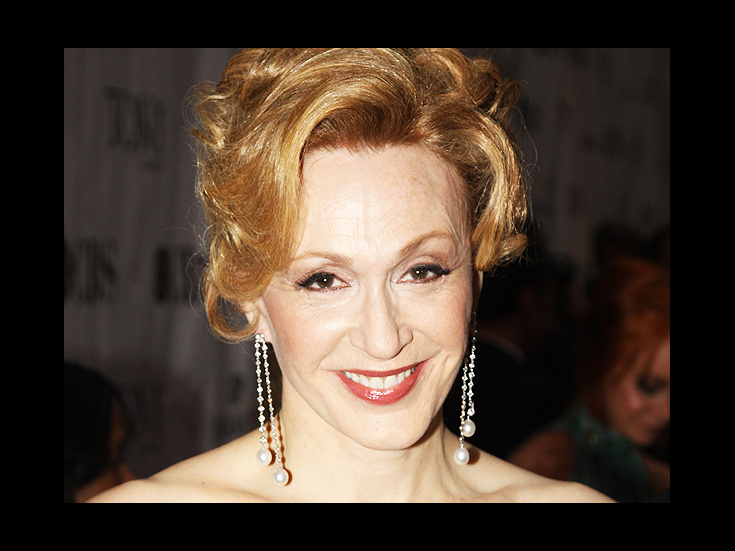Jan Maxwell Recalls Three Tony-Nominated Roles and the Show She Found 'Fascinating and Humbling'
Jan Maxwell has built a stellar theatrical career her way, mixing high-profile Broadway plays and musicals with off-the-radar projects in New York and elsewhere. Since 2005, Maxwell’s Main Stem work has netted an impressive five Tony nominations, including a 2012 Best Actress nod for her performance as glamorously unhappy wife Phyllis Rogers Stone in Follies. Chatting with Broadway.com from Los Angeles, where she is once again contemplating “Could I Leave You?” as Phyllis, Maxwell narrowed her Role Call list to three Tony-honored shows and three lesser-known gems.
 Role That Was the Most Fun
Role That Was the Most Fun
“In Chitty Chitty Bang Bang [as Baroness Bomburst; 2005 Best Featured Actress in a Musical Tony nomination], I was from a fictitious country [Vulgaria], with a fictitious accent that could change nightly, playing someone who treats children like vermin. What’s not to like? Marc [Kudisch as the Baron] and I had a lot of freedom to come up with things; I made up the part where I accidentally killed a soldier when my gun went off, and we did a little patty-cake that my son and I used to do. The backstage antics never stopped because there were so many smart, funny people in the cast, [including] Robbie Sella and Chip Zien. A company of kids is always a lot of fun.”
 Role That Was the Most Physically Challenging
Role That Was the Most Physically Challenging
“Phyllis [in Follies; 2012 Best Actress in a Musical Tony nomination] has been the most challenging in a physical sense. I lost 20 pounds to play the role and got on a very strict workout schedule because I have to dance. It’s emotionally challenging, too, because Phyllis has developed this hard shell from 30 years of being verbally abused and ignored; her husband is disappointed in her, but she always puts her best foot forward. I understand her—I have kind of a tough exterior that I’ve built over the years just to keep moving in theater because it’s not the easiest business. But I’m pretty mushy inside.”
 Role That Was the Most Like Me
Role That Was the Most Like Me
“Julie Cavendish of The Royal Family [2008; Best Actress in a Play Tony nomination] is most like me because she has a deep, deep love for the theater, but still complains about it! Family is very important to her, but she’s also self-mocking and goofy and can be melodramatic in her life. I always wonder what it would be like to go to that extreme—like, if my husband asked me to cook and I collapsed on the floor. That kind of ‘Oh my god, I’m so burdened’ feeling and pitching pretend hissy fits reminds me of Julie.”
 Role That Was Closest to My Heart
Role That Was Closest to My Heart
“I did Camille at the Olney [Theatre Center in Maryland] in 1998 in a wonderful production, and I really, really loved it. Camille is in the ‘oldest profession’ and becomes a renewed person when a younger man falls in love with her. Then his father comes to her and says, ‘You’ve got to let him go,’ so she gives up the love of her life and eventually dies of consumption. It’s one of those old-fashioned, beautiful love stories about a woman who gets to live, love and die. As an actress, you get to play everything, so that was very close to my heart.”
 Role That Was the Most Rewarding
Role That Was the Most Rewarding
“Political plays are my favorite things to do, and I have a favorite playwright, Howard Barker. In 2008, we did Scenes from an Execution at the Atlantic with the Potomac Theatre Project. It’s about a woman artist who has been commissioned by the government to depict a battle in a heroic sense, but she decides to depict it as it really is, with blood on the hands of the generals and dead bodies everywhere. She is on stage the entire night and is the motor of the play. It’s the only production that when I saw I had 11 performances left, I burst into tears because I loved it so much. Howard Barker is like a modern-day Shakespeare. He’s very poetic, very political, very dirty, very sexy—and virtually unproduce-able because he writes so many characters. His scripts are an incredible meal for any actor.”
 Role That Was the Most Mentally Challenging
Role That Was the Most Mentally Challenging
“In Wings [2010], I played a woman who is the victim of a stroke and speaks gibberish, so the memorization process felt almost insurmountable. You memorize your lines and then you have to forget them because you can’t find the word you’re supposed to say. I was interested in exploring how life can change in a heartbeat. When I met aphasia patients, it was fascinating and humbling to see people who could understand everything people were saying but had been unable to communicate for years. One patient who came to see the play could say just one word, ‘No.’ That was a very hard performance, because if I said something he related to, he would say ‘no’ out loud to me on the stage. Most of my job for that play was listening to people’s stories in the lobby afterward about relatives who had had strokes. It was quite a profound experience.”
 Jan Maxwell
Jan Maxwell
